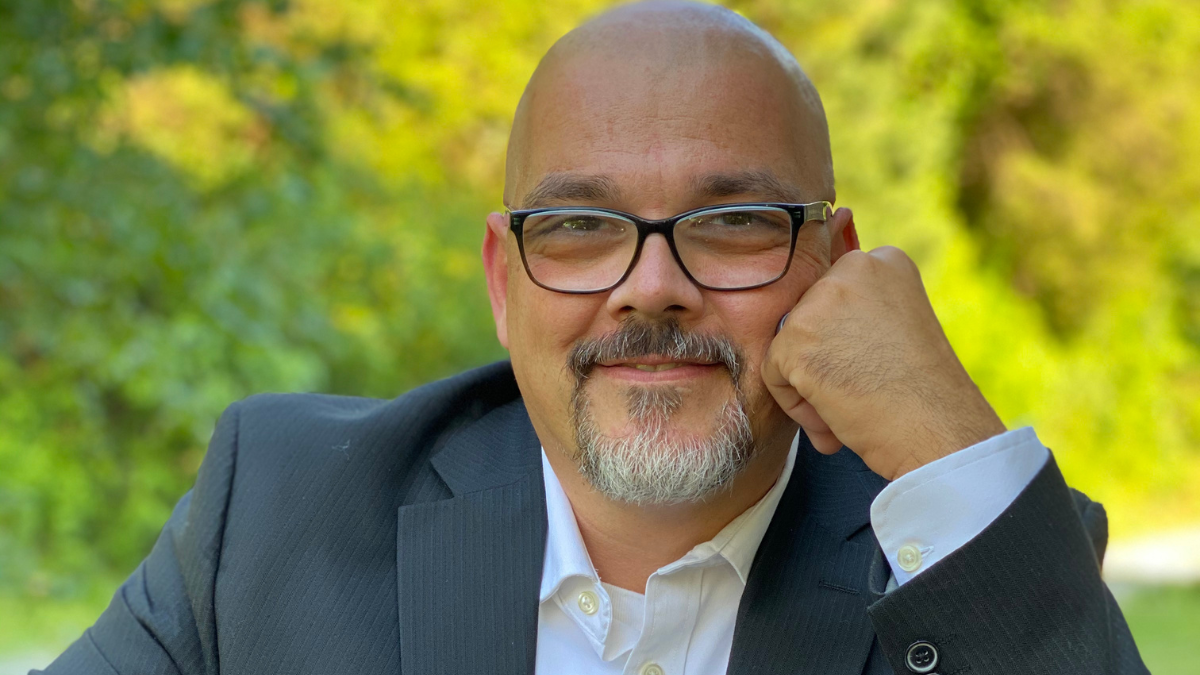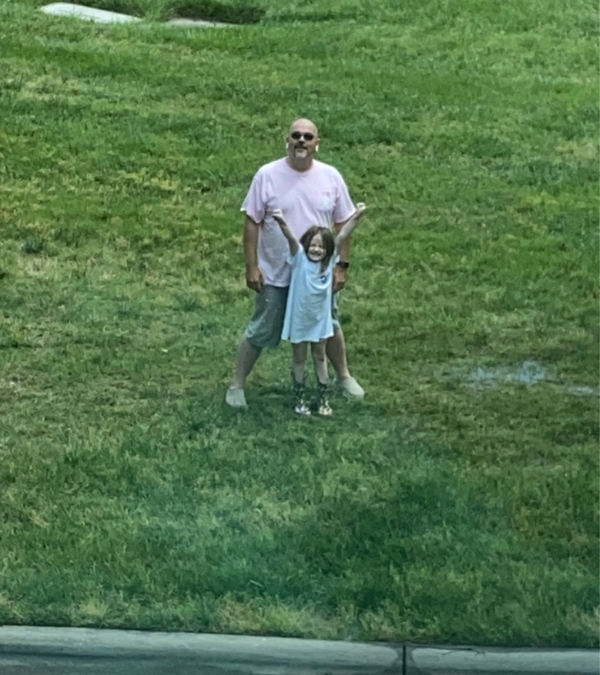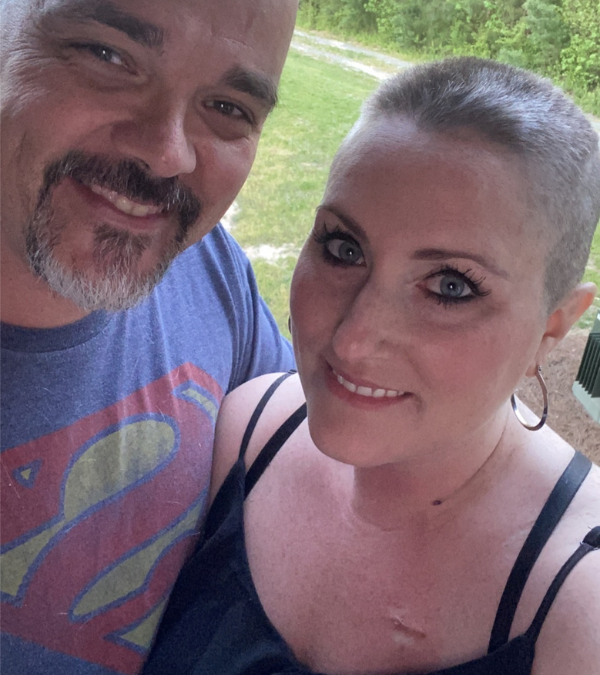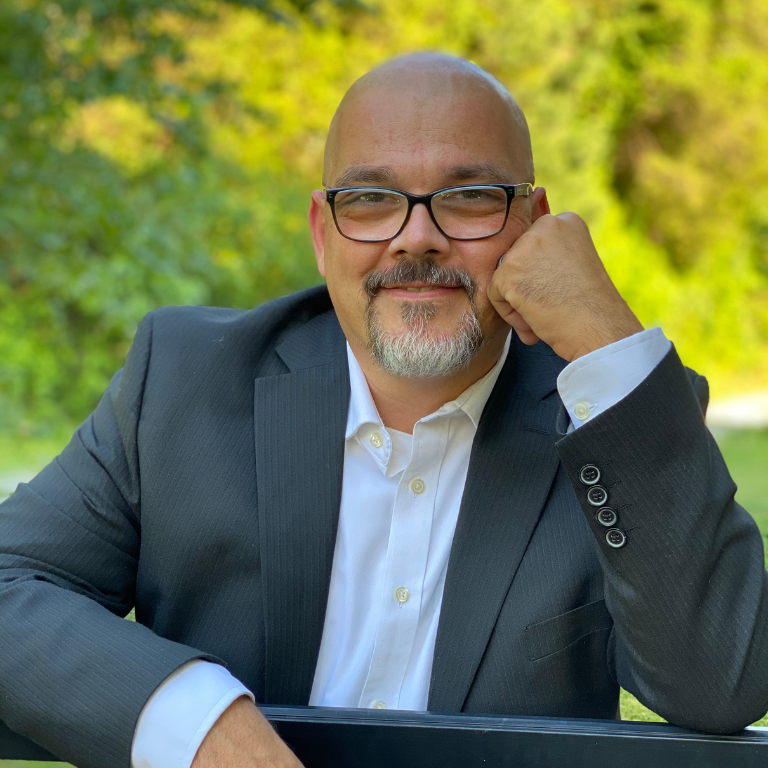2022 Abby Lessack Caregiver Award profile: Jack Coleman
- 11/16/22
In 2022, LBBC inaugurated the Abby Lessack Caregiver Award to celebrate caregivers and the important role they play in the lives of those impacted by breast cancer. Jack Coleman is one of the five honorees, and when you read his interview with Jean, you’ll understand why. Click here to learn more about all five of this year's Abby Lessack Caregiver Award honorees.

Jack Coleman lives in Fort Mill, South Carolina, with his wife, Rifka, and their six kids, who range from four to 21 years old. Jack Coleman served as the primary caregiver for Rifka when she was in treatment for triple-negative breast cancer. Jack found ways to continually show up and support his wife despite added challenges due to the pandemic.
During a time when limitations were placed on visitors’ presence, Jack found creative ways to remain present and ensure his wife never felt alone. He remained close with Facetime check-ins and window dance routines to keep Rifka’s spirits high. Jack stepped up in a major way to ensure that not only his wife was taken care of, but their six children as well.
Jack spoke with LBBC’s CEO Jean Sachs, about his experience caregiving for Rifka.
Jean: Describe a little bit for us what caregiving was like for you and some of the things you did.
Jack: One of the hardest things about being a caretaker is that you can't take it away. I'm a fixer by nature, but I couldn’t fix the cancer. So, it was a matter of making sure that Rifka got plenty of rest, making sure she was eating, making sure she wasn’t overdoing it, because she didn't miss a day of work. Her coworkers really didn't even know she had breast cancer. So, the things that I stepped up to do were just about being in a partnership and a marriage.
I needed to be there for Rifka. If I couldn't be in the building with her when she was having her chemo, I needed to be close by. The two youngest kids and I would load up in the truck, and we'd take her. We had everything that we needed right there in the truck, like snacks or the portable potty for the little one. All the little things we needed to have with us, we had. That way, if Rifka had a need, we could be there quickly.
Then I figured since I couldn't be in the building with her, I needed to do something to let her know how much we love her and how much we support her. So, we did the little dances outside of the window, which it was easy to do when you have little kids with you, because, you know, they're the cute ones. But when you're standing out on the side of a busy highway and dancing around like a crazy person, you feel like everybody's watching. But I'm a center-of-a-room kind of guy. It didn't bother me too much – I knew that she was smiling up there.
The dancing outside of my infusion window brought so much joy to not just me but also my nurses during this horribly stressful time. I looked forward to each week’s new routine. This dance always marked the end of treatment for the day. This helped me have a positive memory associated with infusion, leaving me less anxious about the next.
Jean: I'm sure this was an extra busy time for you. I didn't realize Rifka worked throughout her treatment.
Jack: She did, and her boss didn't know until one day she needed an outpatient surgery, and she had to take off for a half day. Her boss was like, what's going on? And Rifka told her, and she said, “I'm sorry, what?” Because she worked remotely, every day she would get up, and she'd do her job. So, when you talk about caregiving, really the inspiration comes from her. She’s a beautiful, loving, and caring mother. She’s a wonderful wife, but she's tenacious, too. She's a fighter. She's got a true spirit of giving and a true heart for being there for other people. So, I’ve got to do everything I can to make life just a little bit easier for her.
Jean: Is there anything you really want us to highlight, what was one of the most rewarding parts of taking care of Rifka?
Jack: One of the most rewarding things was that our little boy, he was 18 months old when she was diagnosed, through her hair loss, through everything, he still loved on his mama. He still hugged her, kissed her was just like the little boy that he was beforehand. And, you know, I guess if I had to go back and say what was most rewarding, I guess I would say that if I could narrow it down to one thing, it was that the love that I could see between her and everybody else.


Jean: That's amazing. Kids keep you really motivated, absolutely. Speaking of motivation, what kept you going? I'm sure there were times when it was overwhelming.
Jack: It goes back to what I said before: It's doing things to make her life just a little bit easier. If you don't do it, it's not going to get done. Or, worse, she's going to get up and try to do it. The fact that she was fighting for her life made it a lot easier for me to put the dishes away.
Jean: Amy Lessack was one of our longtime board members, donors, and volunteers. She had lived with metastatic breast cancer for many years, but, in her mid-fifties, she was really struggling with disease progression. Amy was single, so her younger sister, Abby, decided she had to tell her husband that she was moving in with Amy to take care of her. When Amy asked me to create this award, she said, “My sister's sacrificed so much, and I really want people to better understand what caregivers do. If it weren't for her, I wouldn't have been able to stay in my house and have some quality of life.” So, what are the things that you had to sacrifice during this time?
Jack: When you think about what you sacrifice compared to what you gain, that's a very difficult question to answer. I feel like what we gain through this experience is so much greater than losing sleep or having your days monopolized by appointments and things like that. It's hard for me to call anything that I “lost” to sacrifice, because what I gain is that my wife is healthy, and my children are happy.
Jack’s incredible spirit and ability to care for me allowed me to focus on treatment and my health, which was a first for me. I was always taking care of everything and one else. He stepped up in a big way or our family. He lost his job during the pandemic (and our insurance), but never missed a beat when it came to providing for all of our needs.
Jean: All of the honorees are so giving and selfless. Like you, they said what they gained was so much bigger. So, two more questions. If you were going to give advice to someone who was just starting out to be a caregiver, what are some of the things you would want them to know or think about?
Jack: One of the biggest pieces of advice I'd give is that you must have patience. You have to put your feelings in your pocket sometimes, because you're taking care of somebody who has a fear of dying or is dying, you know? They're going through a lot of emotions. There will be times when that person may say things to you or treat you in a way that is maybe not fair. But then you have to take a step back, and remember that you’re not physically going through cancer, so you have to be the emotionally stronger one. That's the biggest thing that I was able to take away, as I said earlier in the conversation, is knowing that I couldn't take away the pain or the nausea or the sickness, but I was in a situation where I had to understand all of that and not take anything personally.
Jean: That's great. The last question is: When you first found out that you were nominated, what was your reaction?
Jack: I was shocked, because I don't see myself as doing anything that anybody would do for somebody that they love. So, it's an honor to even be considered, by anybody to have done something extraordinary when I would, I dare say, I'd walk to the end of the world for her.
Watch Rifka’s “Cancer & Chemo During the Pandemic” video, which includes choreography by Jack and children (starting at 2:40).
Stay connected
Sign up to receive emotional support, medical insight, personal stories, and more, delivered to your inbox weekly.



